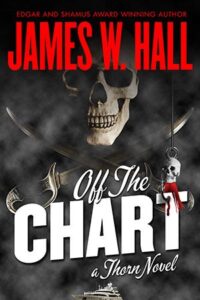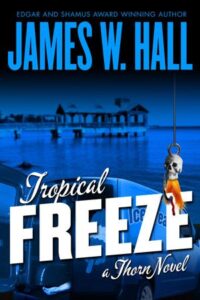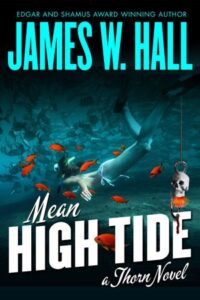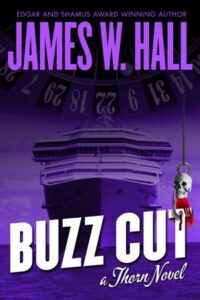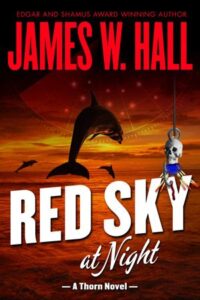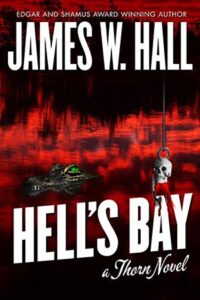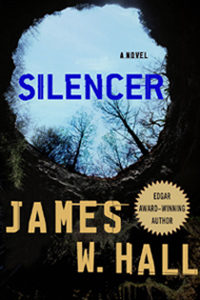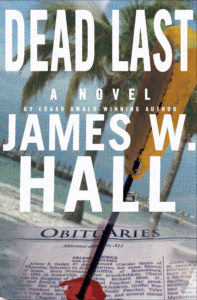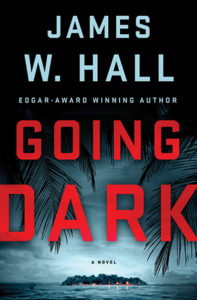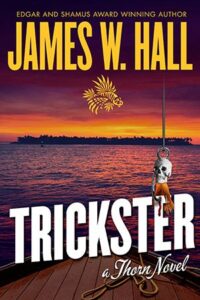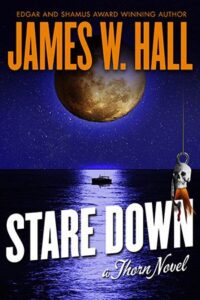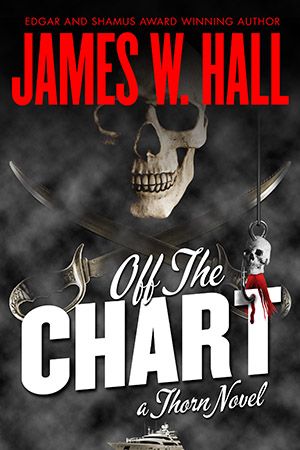
An early review in Publisher’s Weekly:
Publishers Weekly,Hall (Blackwater Sound; Buzz Cut; etc.) once again sweeps the sand, surf and swamps of Key Largo, in a hyperdramatic mystery featuring sensitive tough-guy Thorn and his live-in girlfriend, Alexandra Rafferty. Hall sums up the plot nicely at the beginning of the book: “Lunacy and violence. Pirates, pirates, pirates.” Thorn’s long-ago fling with a beautiful woman named Anne Joy comes back to haunt him years later when Anne’s brother, Vic Joy, a modern-day pirate along the Gulf Coast, decides he needs to add Thorn’s five-acre property to his ill-gotten business and real estate empire. Anne and Vic are the damaged products of a dirt-poor Kentucky upbringing overseen by a smalltime dope-dealing father and a deranged mother with an all-consuming passion for pirates. Thorn refuses to sell to Vic, triggering a complicated coercion scheme that eventually includes the kidnapping of the nine-year-old daughter of Thorn’s best friend. The local body count builds until Thorn is in an all-out battle against the deranged Vic, with a complement of U.S. helicopters and a small army of cutthroat international pirates. Hall’s crisp writing, plus the ticking-clock suspense of the child-in-peril subplot and amusing secondary characters like Alexandra’s dotty dad make this an exhilarating addition to the series. (June) Forecast: Hall is generally considered to be the stylist of the South Florida bunch and should be recommended to those fans of Hiassen, Leonard and Standiford.
This is not a memory I like to recall, but even after 20 years the anguish of the moment is still fresh.
In 2004, a year after this book was first published, I was at a writers conference when I was asked by someone in the audience to describe a favorite storyline I’d written. There were a couple of other novelists on the panel that day, both of whom were friends.
I described a plot thread in Off the Chart, one that I worked hard on and that struck me as very original. Sugarman’s nine year old daughter was kidnapped and held hostage in some unknown location. As it turns out that location is somewhere in Central America. The daughter finds a way to communicate with her father but since she doesn’t know her exact location she uses her extensive naturalist knowledge of flora and fauna to help zero in on where she is. Birds and plants and the time of sunset and the prevailing winds and other details she’s able to observe.
Using these bits of information, little by little Sugarman and Thorn are able to circle in on her exact location and rescue her. That use of natural details required a lot of research on my part and a good bit of deductive logic. I was proud of that plot line and had fun detailing it to the assembled audience that morning.
A year or so later one of the novelists on that panel published a novel with the exact same device. Kidnapped child held in an exotic location who is able to guide her savior by observing and relaying natural details.
Now I know that all writers are sponges and that we are all a little amoral when it comes to seizing the next good idea. I’ve been around writers before when a really cool idea crops up in the surroundings and one of the writers will say, “I got dibs on that.” Always a funny moment.
I confronted this writer friend who’d obviously either consciously plagiarized my work or somehow managed to forget where his idea came from and thought it was his own. He denied plagiarizing of course. No apology, no shock. Just denial. After that initial conversation in which he denied stealing the idea I ran back through that day of the panel discussion and recalled that this writer and I had breakfast together before the event. He had a couple of bloody Marys with his toast. And he told me the story of having not slept the night before.
When I talked to him again I reminded him of the bloody Marys and the sleepless night and gave him a chance to own up to copying the idea he’d heard me . Tipsy and groggy from the lack of sleep, a perfect out.
To my disappointment he denied the claim again. I was just looking for even a half-hearted mea culpa. But I got bluster instead. This is a guy I’d spent several very pleasant days with in various situations, and I didn’t want to end our friendship this way.
But sadly the friendship did end.
So when I look back on Off The Chart I’m always plagued by these bittersweet memories. A lost friendship, a deep disappointment and the less important worry that someone will read his novel and mine and without checking the publication dates might think I plagiarized one of the plot lines from him.
All this might register as much ado about nothing to some. But I think most writers would understand that this kind of thing is a red line.
One final note: The word plagiarism originates from the Latin term plagiarius, meaning “kidnapper, seducer, plunderer.” This Latin word is derived from plagium, which means “kidnapping,” and is based on the root plaga, meaning “snare” or “net.”
It’s somewhat fitting that my story about kidnapping would itself be the victim of kidnapping.



